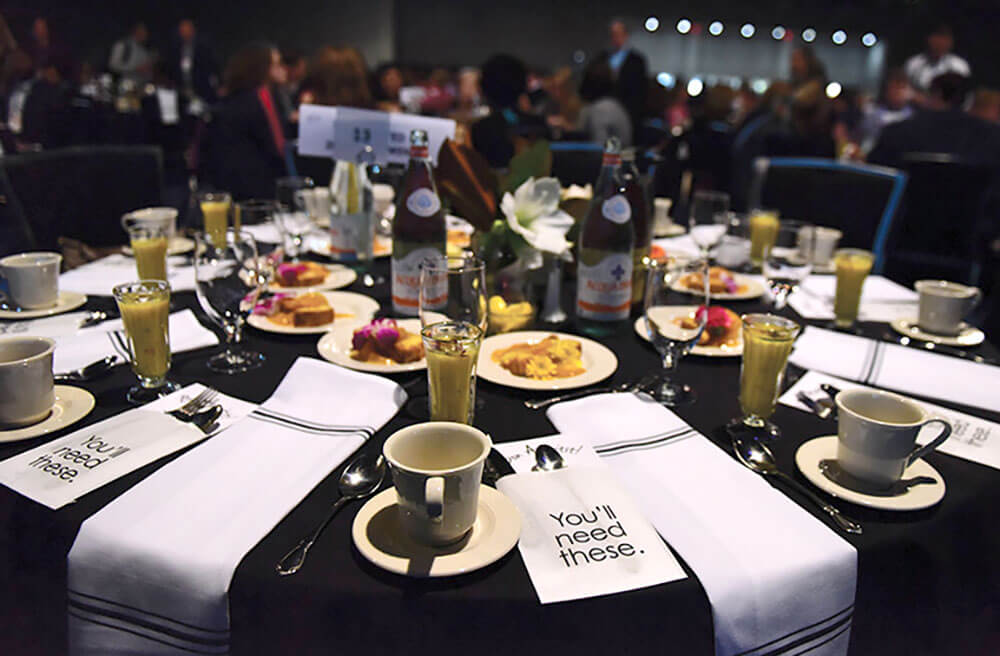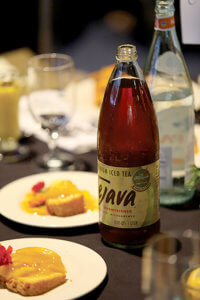
Two three-course lunches at Convening Leaders avoided the eight common food allergens: milk, eggs, fish, shellfish, tree nuts, peanuts, wheat, and soybeans.
Usually when you serve attendees a nice seated lunch and post a menu proclaiming what you’re serving, you highlight all the amazing ingredients that have gone into the meal. But for the two three-course lunches that PCMA plated up during Convening Leaders 2017 at the Austin Convention Center last month, the menus called out everything that wasn’t there—namely, the “big eight” food allergens: milk, eggs, fish, shellfish, tree nuts, peanuts, wheat, and soybeans. Preparing thousands of delicious meals without using any of these building-block ingredients was quite a challenge, but based on attendee feedback, PCMA and Levy Restaurants—the convention center’s caterer, led by executive chef Brad Kelly—pulled it off. The week after Convening Leaders, we talked to Alison Milgram, CMP, DES, senior events manager for PCMA, about how it all came about.
What made PCMA decide to do this?
[At Convening Leaders] in 2016, in Vancouver, we had roughly 4,000 attendees, and I had nearly 600 dietary requests. They ranged from all of your basic vegetarian, gluten-free, vegan [requests], and then they went through to things like, “I’m paleo,” “I suffer from night-shades,” “I’m allergic to latex,” “I can’t eat oranges.” It just became so minute in terms of what people were allergic to or what they were trying to avoid that we turned around and said, “Okay, what can we do to lessen this number and make it a little bit easier on our participants and, quite frankly, on ourselves?” This year, in 2017, by doing that, I had 330 dietary requests.
How did you get the word out in advance of Convening Leaders?
We put it in registration. You always ask for people’s dietary requirements. This year, instead of giving them all of those different [individual] options, we said, “We’ve already taken care of this piece. Now let us know if you’re vegetarian or vegan, if you’re gluten-free, if you’re kosher, or if you eat kosher style.” Those are the things that we tallied up and took care of separately.
There were only three or four people that came to me separately and said, “I saw this and I appreciate it, but actually I can’t eat onions,” or “I need you to know I’m allergic to sesame.” For those people, I knew it was really important to their health and wellbeing, because they took that extra step to find me and say, “I just need you to know that this is my allergen. I didn’t see it listed. I just want to make sure.”
How did attendees respond to this on site?
It seemed to be really well-received. One of the other things that we did was, when you walked into the lunch room, off to your left-hand side we had a separate station for vegetarian, vegan, and kosher [meals]. It was something we had never tried before, and I heard a lot of positives. You could just go to your table and tell your server that you were vegetarian, vegan, kosher, whatever. Or you could come in and, if you saw this sign, you could go to this station and say, “Hi, I’m one of your vegetarians,” and one of our servers would take a vegetarian plate and follow you to your seat and still serve you, but you were then ensuring that you got your plate right away and you didn’t have to wait for service.
I had a lot of planners come up to me and ask how long PCMA had been doing this. I had to say, “This is the first time. I’ll let you know how it works out.” We had a lot more vegetarian and vegan meals picked up that way than we have in the past, because people came in, they saw that sign, and they said, “Oh, hey, I’m just going to go over here and get my plate, and then I’m going to go to my seat. All is right with the world.”
 In taking on this challenge and publicizing it the way you did in advance, were you worried that you were opening yourself up to criticism if you didn’t succeed?
In taking on this challenge and publicizing it the way you did in advance, were you worried that you were opening yourself up to criticism if you didn’t succeed?
I wasn’t so much concerned about that as I was concerned about what I wouldn’t know. I was more concerned of not knowing about the person who is allergic to oranges or not knowing about some sort of allergy that is not covered. We had a lot of discussions internally about the best way to handle it, and I don’t know that we found the best way, but I think it worked out. I didn’t hear of anyone saying, “Oh, my gosh, so-and-so had an allergic reaction after lunch,” so I think we managed to cover all of our bases as best as we could.
Did you handle the advance tastings for these meals differently in any way?
When I do a tasting, I’m looking for variety. Obviously, you want it to taste good, and once we’re eliminating a lot of these elements—it’s so funny, but you don’t think about all the things that butter goes into, or that cream goes into, or a little bit of flour to make that roux a little thicker.
We don’t want it to taste funny. We don’t want anyone to put it in their mouth looking like, “There’s something not right about this.” We’re looking for things that, in our case, a lot of times can be preset and can sit out, because we do a lot of education [during lunch programs]. I’m always looking for something [for which] three or four thousand plates can be preset, and that dish is going to hold when we preset it.
Part of me hated to point out [the ingredients that were missing], and yet by not pointing it out, then we’re completely contradicting what we were trying to do. But there was that food-and-beverage person in me that wanted to not point it out and then turn around and say, “See? See how amazing food can be without wheat and soy? Look what you can do for your own meetings.” But I don’t get that opportunity. We have to point it out to them.
Do you think you’re creating an expectation for PCMA to take this sort of approach for all of its meals going forward?
Absolutely, yes. Now that I’ve done it once, I’m all in. I definitely want to try it again in New York for [the 2017 PCMA] Education Conference. I absolutely want to go and challenge New York with the same thing I challenged Austin with, and see what they can create for us. I don’t like to just order off the basic banquet menu. I always like to challenge the kitchen. I don’t want to take them too far out of their comfort zone, but a little challenge never hurt anyone.
On the menus for the first allergen-free sit-down lunch at PCMA Convening Leaders 2017, attendees were served the menu above. Lunch on Tuesday was mango gazpacho, roast pork tenderloin with cauliflower mash and glazed carrots, and polenta cake with peach compote. PCMA did catch some flack for serving pork—an ingredient that many people avoid for religious or cultural reasons, in addition to dietary ones. “Our vegetarian meal count went up higher that day with people who didn’t necessarily have ‘vegetarian’ stamped on their badge, but we were ready for that,” said PCMA’s Alison Milgram, CMP, DES. “It was a conversation that we had had when we picked the menus. We like to try new and different things. We had tasted the menu, and it was delicious. It hit a lot of areas that we needed it to hit.”
